Related Research Articles
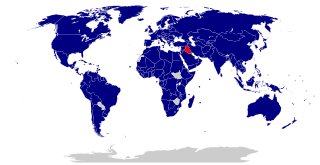
Since 1980, the foreign relations of Iraq have been influenced by a number of controversial decisions by the Saddam Hussein administration. Hussein had good relations with the Soviet Union and a number of western countries such as France and Germany, who provided him with advanced weapons systems. He also developed a tenuous relation with the United States, who supported him during the Iran–Iraq War. However, the Invasion of Kuwait that triggered the Gulf War brutally changed Iraq's relations with the Arab World and the West. Egypt, Saudi Arabia, Syria and others were among the countries that supported Kuwait in the UN coalition. After the Hussein administration was toppled by the 2003 U.S. invasion, the governments that succeeded it have now tried to establish relations with various nations.

Saddam Hussein was an Iraqi politician and revolutionary who was the fifth president of Iraq, from 16 July 1979 until 9 April 2003. He also served as prime minister of Iraq, first from 16 July 1979 until 23 March 1991, and later from 29 May 1994 to 9 April 2003. He was a leading member of the revolutionary Arab Socialist Ba'ath Party, and later, the Baghdad-based Ba'ath Party and its regional organization, the Iraqi Ba'ath Party, which espoused Ba'athism, a mix of Arab nationalism and Arab socialism.
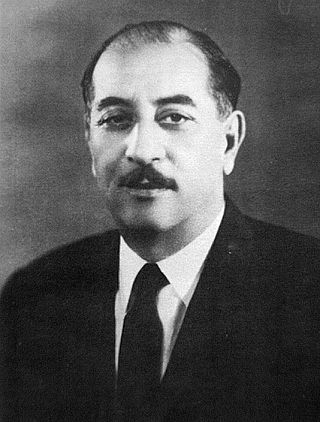
Ahmed Hassan al-Bakr was the fourth president of Iraq, from 17 July 1968 to 16 July 1979. He was a leading member of the revolutionary Arab Socialist Ba'ath Party and later the Baghdad-based Ba'ath Party and its regional organisation Ba'ath Party – Iraq Region, which espoused Ba'athism, a mix of Arab nationalism and Arab socialism.

The president of the Republic of Iraq is the head of state of Iraq and "safeguards the commitment to the Constitution and the preservation of Iraq's independence, sovereignty, unity, the security of its territories in accordance with the provisions of the Constitution". The president is elected by the Council of Representatives by a two-thirds majority, and is limited to two four-year terms. The president is responsible for ratifying treaties and laws passed by the Council of Representatives, issues pardons on the recommendation of the prime minister, and performs the "duty of the Higher Command of the armed forces for ceremonial and honorary purposes". Since the mid-2000s, the presidency is primarily a symbolic office, as the position does not possess significant power within the country according to the October 2005-adopted constitution. By convention, though not by any official legal requirement, the office is expected to be held by a Kurd.

Izzat Ibrahim al-Douri was an Iraqi politician and Army Field Marshal. He served as Vice Chairman of the Iraqi Revolutionary Command Council until the 2003 U.S. invasion of Iraq and was regarded as the closest advisor and deputy under President Saddam Hussein. He led the Iraqi insurgent Naqshbandi Army.
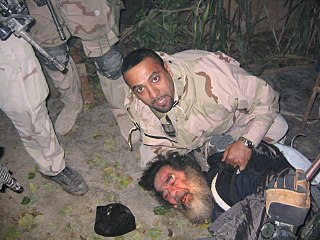
Saddam Hussein, the deposed president of Iraq, was captured by the United States military forces in the town of Ad-Dawr, Iraq on 13 December 2003. Codenamed Operation Red Dawn, this military operation was named after the 1984 American film Red Dawn.

Mowaffak Baker al-Rubaie is an Iraqi politician, and was Iraq National Security Advisor in the government of Prime Minister Ayad Allawi and in 2005-2006 Prime Minister Ibrahim Al Jaafari and 2006-2009 Prime Minister Nouri al-Maliki. He was elected to the Iraqi Council of Representatives in December 2005 as a nominee of the United Iraqi Alliance and from 2014-2018 in the Iraqi Parliament.
The Iraqi Revolutionary Command Council was established after the military coup in 1968, and was the ultimate decision-making body in Iraq before the American-led invasion in 2003. It exercised both executive and legislative authority in the country, with the Chairman and Vice Chairman chosen by a two-thirds majority of the council. The Chairman was also then declared the President of Iraq and he was then allowed to select a Vice President. After Saddam Hussein became President of Iraq in 1979 the council was led by deputy chairman Izzat Ibrahim ad-Douri, deputy Prime Minister Tariq Aziz, and Taha Yassin Ramadan, who had known Saddam since the 1960s.
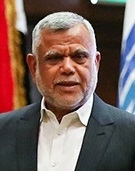
Hadi al-Amiri is the head and secretary general of the Badr Organization, a Shiite organization based in Iraq, he heads the Shiite political organization Badr and his armed group, the Badr Brigade.
The 1975 Algiers Agreement was an agreement between Iran and Iraq to settle any disputes and conflicts concerning their common border, and it served as basis for the bilateral treaties signed on 13 June and 26 December 1975. The agreement was intended to end disagreement between Iraq and Iran on their borders on the Shatt al-Arab waterway and in Khuzestan, but Iraq also wished to end the Kurdish rebellion. Less than six years after signing the treaty, on 17 September 1980, Iraq abrogated the treaty following a series of border clashes between the two countries and launched a full-scale invasion of Iran on 22 September 1980.
Salah Omar Al-Ali was a member of the Iraqi Revolutionary Command Council, Iraqi Minister of Culture and Information from 1968 to 1970, and subsequently ambassador to Sweden, Spain and the United Nations from 1973 to 1981. He is currently a leading member of the Iraqi opposition.

The Iraqi Armed Forces are the military forces of the Republic of Iraq. They consist of the Iraqi Army, the Iraqi Air Force, and the Iraqi Navy. Along with these three primary service branches, there exists the Iraqi Counter Terrorism Service. The President of Iraq acts as the supreme commander as outlined by the constitution.

Hardan ’Abdul Ghaffar al-Tikriti was a senior Iraqi Air Force commander, Iraqi politician and ambassador who was assassinated on the orders of Saddam Hussein. Additionally he held the titles of vice chairman of the Iraqi Revolutionary Command Council and vice president of Iraq.

Adnan Khairallah was Saddam Hussein's brother-in-law and cousin. He held several titles and was a member of the Iraqi Revolutionary Command Council. He also served as the Defence Minister of Iraq from 1979 until his death, being appointed days after Saddam Hussein succeeded to the Presidency.
The United States (U.S.) Central Intelligence Agency (CIA) has been involved in covert actions and contingency planning in Iraq ever since the 1958 overthrow of the Iraqi monarchy, although the historiography of Iraq–United States relations prior to the 1980s is considered relatively underdeveloped, with the first in-depth academic studies being published in the 2010s. While the CIA was not directly involved in the 1963 Ba'athist coup that ousted Abd al-Karim Qasim, it had been plotting to remove Qasim from mid-1962 until his overthrow, developing contacts with Iraqi opposition groups including the Ba'ath Party and planning to "incapacitate" a high-ranking member of Qasim's government with a poisoned handkerchief. After the 1968 Ba'athist coup appeared to draw Iraq into the Soviet sphere of influence, the CIA colluded with the then-monarchial government of Iran to destabilize Iraq by arming Kurdish rebels, who suffered a total defeat after Iran and Iraq resolved their border dispute. Beginning in 1982, the CIA began providing Iraq intelligence during the Iran–Iraq War. The CIA was also involved in the failed 1996 coup against Saddam Hussein.

Diplomatic relations between Iraq and the United States began when the U.S. first recognized Iraq on January 9, 1930, with the signing of the Anglo-American-Iraqi Convention in London by Charles G. Dawes, U.S. Ambassador to the United Kingdom. The historiography of Iraq–United States relations prior to the 1980s is considered relatively underdeveloped, with the first in-depth academic studies being published in the 2010s. Today, the United States and Iraq both consider themselves as strategic partners, given the American political and military involvement after the invasion of Iraq and their mutual, deep-rooted relationship that followed. The United States provides the Iraqi security forces hundreds of millions of dollars of military aid and training annually as well as uses its military bases.

After World War I, Iraq passed from the failing Ottoman Empire to British control. Kingdom of Iraq was established under the British Mandate in 1932. In the 14 July Revolution of 1958, the king was deposed and the Republic of Iraq was declared. In 1963, the Ba'ath Party staged a coup d'état and was in turn toppled by another coup in the same year, but managed to retake power in 1968. Saddam Hussein took power in 1979 and ruled Iraq for the remainder of the century, during the Iran–Iraq War of the 1980s, the Invasion of Kuwait and the Gulf War of 1990 to 1991 and the UN sanction during the 1990s. Saddam was removed from power in the 2003 invasion of Iraq.
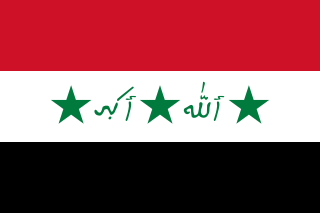
Ba'athist Iraq, formally the Iraqi Republic until 6 January 1992 and the Republic of Iraq thereafter, covers the national history of Iraq between 1968 and 2003 under the rule of the Arab Socialist Ba'ath Party. This period began with high economic growth and soaring prosperity, but ended with Iraq facing social, political, and economic stagnation. The average annual income decreased both because of external factors such as the heavy sanctions placed on Iraq by Western countries and the internal policies of the Iraqi government.
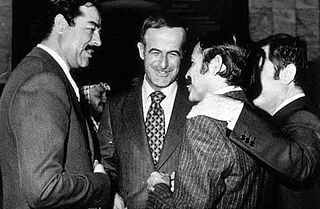
The 1979 Ba'ath Party Purge or Comrades Massacre was a public purge of the Iraqi Ba'ath Party orchestrated on 22 July 1979 by then-president Saddam Hussein six days after his arrival to the presidency of the Iraqi Republic on 16 July 1979.
The 1974–75 Shatt al-Arab conflict took place between the Imperial State of Iran and Ba'athist Iraq from April 1974 to March 1975, and occurred as a direct result of their territorial dispute in the region. It was concentrated around the Shatt al-Arab, a river in Western Asia that partly flows along the Iran–Iraq border. The conflict took place over the course of 11 months and resulted in over 1,000 total casualties. It was the most significant spike of bilateral tensions between Iran and Iraq over the Shatt al-Arab waterway before the protracted Iran–Iraq War in the 1980s following the Iranian Revolution and the subsequent establishment of the Islamic Republic of Iran.
References
- ↑ "Foreign Relations of the United States, 1969–1976, Volume XXVII, Iran; Iraq, 1973–1976 - Office of the Historian". history.state.gov. Retrieved 2021-01-28.
- 1 2 "IRAQ 1921-2003". The Wanderlust Herald. 2020-09-05. Retrieved 2021-01-28.
- ↑ "IRAQ: The Plot That Failed". Time. 1973-07-16. ISSN 0040-781X . Retrieved 2021-01-28.
- ↑ "Foreign Relations of the United States, 1969–1976, Volume XXVII, Iran; Iraq, 1973–1976 - Office of the Historian". history.state.gov. Retrieved 2021-01-28.
- ↑ Ghareeb, Edmund A.; Dougherty, Beth (2004-03-18). Historical Dictionary of Iraq. Scarecrow Press. ISBN 978-0-8108-6568-6.